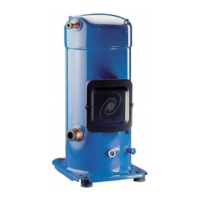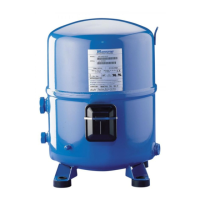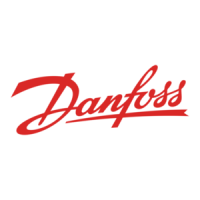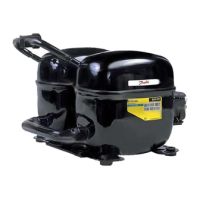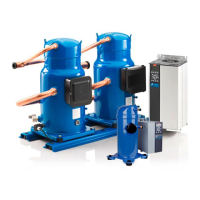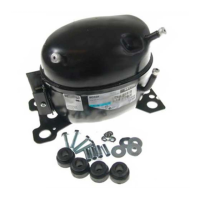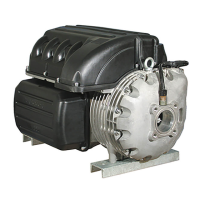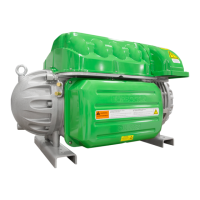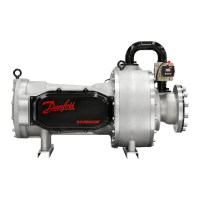Do you have a question about the Danfoss R134a and is the answer not in the manual?
Explains the structure and meaning of the compressor model names.
Provides detailed technical specifications for compressors operating at 50 Hz.
Provides detailed technical specifications for compressors operating at 60 Hz.
Specifies the standard conditions under which compressor performance is rated.
Detailed dimensional drawings for SM/SZ 084 to 120 compressor models.
Dimensional drawings for SM 112-124 and SM/SZ147 compressors.
Dimensional drawings for SM/SZ 147 compressors with code 3.
Dimensional drawings for SM/SZ 148 and 161 compressor models.
Dimensional drawings for SM/SZ 175-185 and SY185 compressors.
Dimensional drawings for SM/SZ 185 P, X, Y version compressors.
Dimensional drawings for SY 240, 300, and 380 compressor models.
Details on suction, discharge, oil, and other connections for various models.
Information on available motor voltages and voltage ranges for compressors.
Guidance on electrical connections and terminal box configurations for models.
Electrical data including LRA, MCC, MMT, and winding resistance.
Describes the different motor protection methods used for various compressor models.
Explains protection against incorrect phase sequence and reverse rotation.
Discusses the effects of voltage unbalance and its calculation.
Details on the MCI soft-start controller for reducing starting current.
General guidelines for safe and reliable compressor wiring practices.
Lists the various approvals and certifications the compressors comply with.
Details compliance with the Pressure Equipment Directive.
Details compliance with the Low Voltage Directive.
Details compliance with the Machines Directive.
Provides the internal free volume for different compressor models.
Information on choosing refrigerants and lubricants for compressor applications.
Guidelines for motor supply, ambient temperature, and their effects.
Defines operating limits for dew point temperatures for various refrigerants.
Shows operating limits for R134a and R513A across different compressor models.
Details operating limits for R404A, R507A, and R407C applications.
Illustrates operating limits for R407C based on mean temperatures.
Provides example operating envelopes for dew and mean temperatures.
Covers discharge temp, MOP, HP/LP safety switches, and relief valves.
Details low pressure switch settings and compressor cycle rate limitations.
Importance of correct compressor selection for system performance and reliability.
Best practices for suction and discharge line piping to ensure oil return.
Considerations for evaporator and condenser design for efficiency.
Guidelines for limiting refrigerant charge to protect compressor service life.
Discusses refrigerant migration and liquid floodback prevention strategies.
Explains the role and design considerations of suction accumulators.
Recommendations for start-up, operations, and head pressure control in cold conditions.
Guidelines for running compressors at minimum load to ensure oil return and cooling.
Specific considerations for systems using brazed plate heat exchangers.
Requirements for using electronic expansion valves with compressors.
Precautions for ensuring compressor life in reversible heat pump applications.
Importance and setting of discharge gas thermostats for protection.
Recommendations for discharge line components and their impact on pressure.
Considerations for compressor behavior during defrost and reverse cycles.
Recommendation for suction line accumulators in reversible cycles.
Precautions regarding water in refrigeration circuits, including freezing and corrosion.
Details on starting, running, and stopping sound levels for compressors.
Breakdown of sound sources in refrigeration systems: radiation, vibration, pulsation.
Methods to reduce airborne sound transmission from compressors.
Techniques for controlling structural vibrations using isolators and mounting.
Managing gas pulsation in air conditioning systems and heat pumps.
Safe procedures for lifting, handling, and storing compressors.
Guidelines for properly mounting compressors using grommets and bolts.
Information on the nitrogen holding charge and its release before installation.
Importance of maintaining system cleanliness to ensure performance and reliability.
Requirements for clean, dehydrated copper tubing and proper connections.
Recommended procedures and materials for brazing compressor connections.
Specific instructions for brazing compressor fittings to avoid overheating.
Guidelines for performing pressure tests using inert gases.
Methods for leak detection and pressure test limits.
Procedures for dehydrating the system to remove moisture.
Selection criteria and recommendations for filter drier types.
Procedures for initial refrigerant charge and commissioning.
Requirements for insulation resistance and dielectric strength testing.
Monitoring compressor operation after initial start-up for proper characteristics.
Procedures for checking and topping up compressor oil levels.
Information on single and industrial pack dimensions and quantities.
How to order Danfoss scroll compressors in various pack configurations.
Model codes for single SM/SY compressors by connection and motor protection.
Model codes for industrial pack SM/SY compressors by connection and motor protection.
Model codes for single SZ compressors by connection and motor protection.
Model codes for industrial pack SZ compressors by connection and motor protection.
Various adaptors for connecting tubing to rotolock connections.
Sealing gaskets and solder sleeve types for compressor connections.
Rotolock nuts and service valve sets for specific applications.
Electronic soft start kits and surface sump heaters for compressor protection.
Discharge thermostat kits and mounting hardware for compressor installation.
Acoustic hoods for noise reduction and motor protection modules.
Various accessories including terminal boxes, lubricants, and sight glasses.
| Refrigerant | R134a |
|---|---|
| Refrigerant Type | HFC |
| Global Warming Potential (GWP) | 1430 |
| Ozone Depletion Potential (ODP) | 0 |
| Application | Air Conditioning, Refrigeration |
| Critical Temperature | 101.1 °C (214 °F) |
| Critical Pressure | 4.059 MPa |
